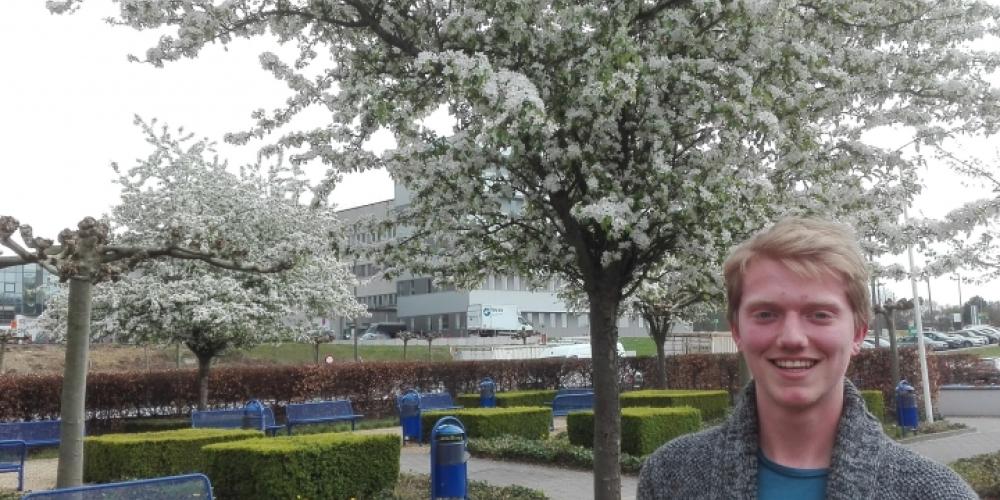
NULLThe essence of what IFMSA and all its local partners are about, is social commitment to fellow students and society on the one hand, and the resulting soft skills training on the other. Apart from Teddy Bear Hospital, Heart for Life is another project of theirs, where they offer free heart check-ups in shopping centres. Other activities include SOS, which is sex education for secondary school pupils, and the AIDS quiz. The underlying idea is that doctors in training already master a variety of skills and therefore do not need to wait for six years before committing themselves to society. At the same time, the students come into contact with diverse groups of patients.
Projects related to health and sex education
“The IFMSA, BeMSA, and all local branches are organised around six themes, the so-called standing committees”, says Wannes. “This fixed structure enables cooperation between all levels under the slogan ‘Think Global, Act Local’. The theme Public Health is the most visible to the public thanks to our social activities including Teddy Bear Hospital or Heart For Life, but Basic Life Support, for example, which provides special additional CPR training for fellow students, equally belongs to this domain. Societal and student needs always go hand in hand.”
“Our second theme is Reproductive Health, also known as sex education. One of the activities we organise is the Stigma Challenge, which is a pop-up event to inform students about STD’s, HIV, and birth control,” says Wannes. “In addition, our SOS programme educates fellow students to teach sex education in an entertaining way to pupils. The proceeds from our annual AIDS quiz go to these two amazing initiatives.”
International opportunities
Furthermore, they make use of their international network to offer international experiences to fellow students. “Within the theme of Professional Exchange we arrange internships abroad for fellow students, but we also accommodate international students. We carry out the same work within Research Exchange, but then related to research, which has become a popular programme at the VUB,” says Wannes. They also participate in the IFMSA meeting twice a year. As a result, Wannes went to Montenegro for a whole week last year with a thousand students from all over the world to work on the different standing committees together. “For example, I followed a training programme to recognise signs of student burnout, which was an unforgettable experience concerning a topical issue. Did you know that approximately one medical student out of two is confronted with this phenomenon during his or her studies to a greater or lesser extent?” says Wannes.
Human Rights and Peace, which was the fastest growing department of BeMSA VUB over the past year, has an international dimension as well. “For example, we are considering how we can get involved as medical students in affordable health care for refugees. But then again, local engagement is a possibility here too, which could include making students aware of the human rights that are violated every day,” says Wannes.
Meet your doctor
Within the sixth domain called Medical Education, BeMSA is less active at the local level. “Organisations including VGSO, the Flemish Medical Students’ Association, and GSP, the Medical Students Platform, are already realising quite a lot in this regard. So we are very happy that we can collaborate with these fantastic organisations in this respect. By means of illustration, last year we organised the event Meet Your Doctor together for the first time,” he says. They invited both local doctors and doctors connected to the university hospital outside the traditional educational context. Students could ask them all sorts of questions related to practical matters, including the start-up of a medical private practice, or their personal experiences as doctors in their daily lives. “It was a very instructive evening, complementary to what we learn during our classes or internships. We are anticipating a large turnout again this year.”
“Social engagement comes naturally to a medical student”
Wannes says that despite the fact that you are committed to others and society in general, you benefit from this social engagement on a personal level as well. “I got acquainted with BeMSA VUB through one of their projects, but quickly acquired a taste for it. What I am learning here I will continue using throughout my life. To be a medical student is already a form of engagement in itself, as you have decided on a social role. As a result, becoming socially involved during your studies is not a big step.”
“Furthermore, VUB is the ideal environment. We might be smaller in numbers, but the enthusiasm at BeMSA VUB matches that of the other student cities. On the contrary, the small scale of the organisation makes it easier to accomplish things. Students’ initiatives are really being encouraged at this university!” Wannes says enthusiastically.
At BeMSA they are committed to others and they get much satisfaction out of this commitment. “But the knowledge, experience, and skills we derive from it equally offer a great advantage. A lot of things we are learning within BeMSA come in useful in our everyday lives and without a doubt in our future careers as well. Thanks to our social commitment, we are acquiring specialised know-how as well as the audacity to change the things we do not agree with. When I was diagnosed with the nerve disorder called multiple sclerosis about half a year ago, I noticed that many of my fellow students had some idea of the pathophysiological processes that are involved, but no one, including myself, really knew what the disease entailed. Due to my experience within BeMSA, it did not take long before I decided to change this and to organise a lecture on this topic in order to inform people.”
“This is really what BeMSA stands for: interaction between striving for a healthier society on the one hand, and personal development on the other. Both go hand in hand at BeMSA.”
You can find more information on: http://bemsa.vub.ac.be/